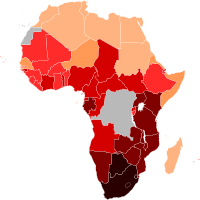
Photo from wikipedia
BackgroundAmong HIV serodiscordant couples, most conception involves condomless sex and may confer a period with increased HIV transmission risk if HIV viral load is not suppressed and other precautions are… Click to show full abstract
BackgroundAmong HIV serodiscordant couples, most conception involves condomless sex and may confer a period with increased HIV transmission risk if HIV viral load is not suppressed and other precautions are not used. Safer conception strategies enable HIV serodiscordant couples to attain their pregnancy goals while markedly reducing this risk. We explored the perceptions and beliefs held by HIV serodiscordant couples and health care providers concerning pregnancy among HIV serodiscordant couples in Kenya and gathered their thoughts about how these might influence use of safer conception methods.MethodsWe conducted 20 Key Informant Interviews (KIIs) with health care providers offering safer conception counseling and 21 In-Depth Interviews (IDIs) and 4 Focus Group Discussions (FGDs) with members of HIV serodiscordant couples with immediate pregnancy goals in Thika, Kenya. Data were analyzed using an inductive approach that identified two emergent themes: perceptions towards pregnancy among HIV serodiscordant couples and access to safer conception services.ResultsThe perceptions held by the community towards couples in HIV serodiscordant relationships having children were largely negative. The participants were aware of the increased HIV transmission risk to the HIV uninfected partners while trying to become pregnant. In the community, having biological children was cherished yet the majority of the couples shied away from accessing safer conception services offered at health facilities due to stigma and lack of knowledge of the existence of such services. Some providers had limited knowledge on safer conception strategies and services and consequently discouraged HIV serodiscordant couples from natural conception.ConclusionsNegative perceptions towards HIV serodiscordant couples becoming pregnant has hindered access to safer conception services. Therefore, there is need to create a supportive environment for HIV serodiscordant couples with fertility intentions that normalizes their desire to have children and informs the community about the availability of safer conception services.
Journal Title: Reproductive Health
Year Published: 2019
Link to full text (if available)
Share on Social Media: Sign Up to like & get
recommendations!